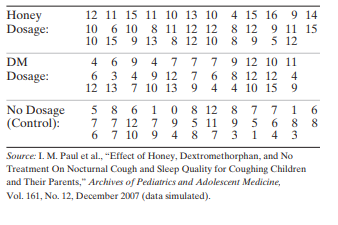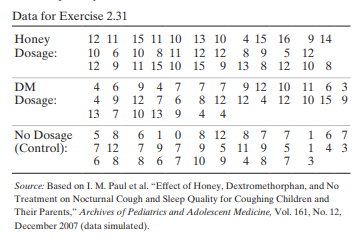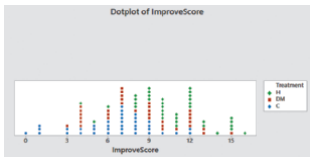Is honey a cough remedy? Pediatric researchers carried out a designed study to test whether a teaspoon of honey before bed calms a child’s cough and published their results in Archives of Pediatrics and Adolescent Medicine (December 2007). (This experiment was first described in Exercise 2.31, p. 86.) A sample of 105 children who were ill with an upper respiratory tract infection and their parents participated in the study. On the first night, the parents rated their children’s cough symptoms on a scale from 0 (no problems at all) to 6 (extremely severe) in five different areas. The total symptoms score (ranging from 0 to 30 points) was the variable of interest for the 105 patients. On the second night, the parents were instructed to give their sick children a dosage of liquid “medicine†prior to bedtime. Unknown to the parents, some were given a dosage of dextromethorphan (DM)—an over-the-counter cough medicine—while others were given a similar dose of honey. Also, a third group of parents (the control group) gave their sick children no dosage at all. Again, the parents rated their children’s cough symptoms, and the improvement in total cough symptoms score was determined for each child. The data (improvement scores) for the study are shown in the accompanying table. The goal of the researchers was to compare the mean improvement scores for the three treatment groups.
a. Identify the type of experimental design employed. What are the treatments?
b. Conduct an analysis of variance on the data and interpret the results.
c. Check the validity of the ANOVA assumptions.

Exercise 2.31
Is honey a cough remedy? Does a teaspoon of honey before bed really calm a child’s cough? To test the folk remedy, pediatric researchers carried out a designed study conducted over two nights (Archives of Pediatrics and Adolescent Medicine, December 2007). A sample of 105 children who were ill with an upper respiratory tract infection and their parents participated in the study. On the first night, the parents rated their children’s cough symptoms on a scale from 0 (no problems at all) to 6 (extremely severe) in five different areas. The total symptoms score (ranging from 0 to 30 points) was the variable of interest for the 105 patients. On the second night, the parents were instructed to give their sick child a dosage of liquid “medicine†prior to bedtime. Unknown to the parents, some were given a dosage of dextromethorphan (DM)—an over-the-counter cough medicine—while others were given a similar dose of honey. Also, a third group of parents (the control group) gave their sick children no dosage at all. Again, the parents rated their children’s cough symptoms, and the improvement in total cough symptoms score was determined for each child. The data (improvement scores) for the study are shown in the table below, followed (in the next column) by a Minitab dot plot of the data. Notice that the green dots represent the children who received a dose of honey, the red dots represent those who got the DM dosage, and the black dots represent the children in the control group. What conclusions can pediatric researchers draw from the graph? Do you agree with the statement (extracted from the article), “Honey may be a preferable treatment for the cough and sleep difficulty associated with childhood upper respiratory tract infection�


"Looking for a Similar Assignment? Get Expert Help at an Amazing Discount!"


